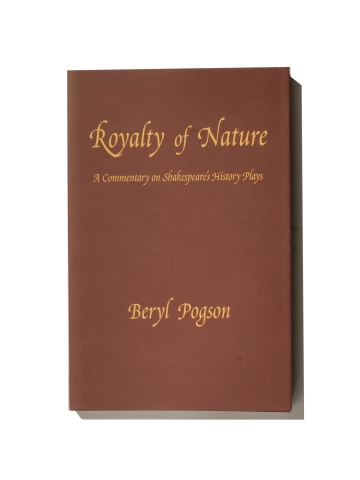
ROYALTY
OF NATURE
Beryl
Pogson
Royalty of Nature is a commentary on the inner meaning of Shakespeare's presentation of History in the nine plays that are the subject of these essays.
From the Introduction:
"... Consider now the Kings in their individual lives. A king is
after all but a man and can only play his part to the limit of his being.
But he plays it in public, as it were. And therefore he may be said to
be enacting a man confronting all the trials and temptations that beset
him at a certain stage of development. He is thus an example for good
or evil, showing his people what to imitate, what to avoid.
The Crown of gold is the symbol of the highest level known to humanity.
It represents Heaven, or the Divine Ruler in the Soul of Man. Richard
III coveted it and loved it, but Henry V of all the kings showed the greatest
reverence towards the crown and when he wore it at Agincourt he had some
inkling probably of its powers of protection. He was not trusting in himself
as a man, but only as a King.
When Richard II gave away his Crown he had forgotten the implications
of such an act. A King is given a difficult part to play and cannot attempt
to play it without all the help of which the Regalia are symbols. The
sceptre is the magic wand, giving him power over the element of Air, of
the Mind, the Holy Oil protects him, the Orb surmounted by the Cross reminds
him that he has to sacrifice himself to his land. Ordinary people in contemplating
the grandeur of royalty are given some idea of the highest that may be
attained by Man. ..."
BACK